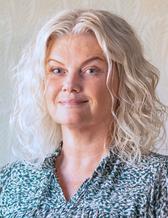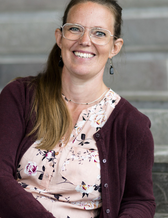
- Home
- News and events
- Find news
- Interaction of proximity, network and gut feeling when recruiting managers
Interaction of proximity, network and gut feeling when recruiting managers
Masculine ideals and strong local networks favour men and reduce women's opportunities in the labour market in Värmland. A new report on recruitment to senior posts in the region identifies challenges for a more gender-equal supply of skills.
– Perceptions of sex and gender, networks and practices among recruiters and managers in Värmland constantly recreate norms about skills that favour men. Both competence-based recruitment and network recruitment need to be problematised.

So says Ulrika Jansson, PhD in Working Life Science, Swedish Secretariat for Gender Research, University of Gothenburg, who has written the report ”Kompetens och kön i Värmland – en fråga om närhet, nätverk och magkänslor” (Competence and gender in Värmland - a question of proximity, networks and gut feelings) together with Lena Grip, Associate Professor in Human Geography, Karlstad University.
Conditions for jobseekers differ

The study was commissioned by Region Värmland, as part of the project Attraktionskraft Värmland. The aim of the study is to shed light on how perceptions of competence and gender affect the supply of competence, and recruitment of senior officials and persons in senior management in Värmland.
The researchers have interviewed people who work in different ways with recruitment in and to the private and public sector in Värmland; people at recruitment companies, HR functions, hiring managers and recently hired managers. The material has been analysed from a gender perspective and gender studies has been used to make conditions and structures visible, thereby raising awareness of gendered conditions.
– Inequality in recruitment processes is often made an issue of women's perceived shortcomings, such as lacking the right education, experience or qualities. Or that there aren't even any women to recruit. Recruiters and managers need to see that the conditions and circumstances of job applicants differ," says Ulrika Jansson.
It is difficult to establish yourself in Värmland without networks or contacts. Who is recruited is greatly influenced by what the report authors describe as various principles of proximity; regional, professional and emotional 'myopia', which creates both inclusion and exclusion. People who know each other, who have worked together in the past, and who can vouch for a particular person to "fit in" often have an advantage.
– When the 'right gut feeling' arises in interview situations, it is important to remember that gut feeling is not a factual basis for recruitment, but risks contributing to the continued selection of people who are similar to each other, says Ulrika Jansson.
Regional lock-in when preferring the local
The importance of place, geographical proximity, means that even newcomers without anchoring in local networks risk being overlooked. Not being born and raised in the local area can reduce the chances of getting a job there. This may also apply to those living in another municipality within the region. Even 'returnees' with education and jobs elsewhere in Sweden may find it difficult to find a job in their home region.
– The pandemic and increased teleworking have to some extent raised the gaze beyond the local, but the proximity principle and the desire to have an employee on the spot is still the most desired scenario, says Lena Grip.
The different proximity principles interact and lead to a regional enclosure that is also gendered. At the same time, there is an awareness that recruitment needs to be broadened, both for the long-term supply of skills and to create attractive workplaces.
– Värmland needs to become better at making use of the people who are already in the region, while at the same time opening up to people and skills from other parts of Sweden and the world,' says Ulrika Jansson.
The report is not translated into english.
